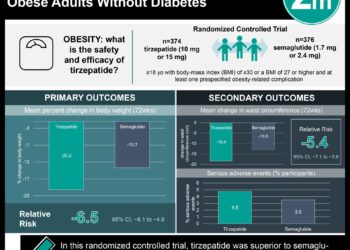Roche: CT-388 Dual GLP1-GIP Receptor Agonist Clinically Improves Weight Loss
- Patients who received CT-388 had an average placebo-adjusted weight loss of 18.8%.
- CT-388 is well tolerated with only mild to moderate gastro-intestinal-related adverse events common with other incretin medications.
The Latest
A recent multi-arm, multi-cohort Phase Ib randomized, double-blind, placebo-controlled study was conducted by the Roche group to evaluate the safety and tolerability of CT-388 as well as its effect on body weight and glucose homeostasis. Over 24 weeks, data showed that CT-388 produced an average weight loss of 18.8%. Additionally, the study found that all participants who received therapy achieved a weight loss of more than 5%, with 85% achieving weight loss of more than 10% and 45% achieving over a 20% weight loss. In terms of safety, CT-388 was well tolerated, with the most commonly reported adverse events involving mild to moderate gastrointestinal events which are consistent with other incretin medications.
Physician’s Perspective
Obesity is linked to numerous comorbidities, including type 2 diabetes, heart disease, non-alcoholic fatty liver disease, and chronic kidney disease. According to the WHO, in 2022, 43% of adults aged 18 years and over were overweight and 15% were living with obesity. Current market leader anti-obesity medications include Wegovy and Ozempic which are both incretin mimetics like CT-388. However, the results of the CT-388 clinical trial appear to surpass the performance of Wegovy and Ozempic. These medications typically only resulted in a 10% reduction of body weight after six months, which is almost half of the weight loss achieved with CT-388.
Molecular Targets
CT-388 belongs to a class of incretin-based medications that regulate blood sugar and reduce appetite. The medication is administered once weekly through a subcutaneous injection and has dual activity on both GLP-1 and GIP receptors. CT-388 differentiates itself from other medications in its class by its biased signaling effect that minimizes recruitment of ß-arrestin, which results in greater weight loss while achieving more favorable tolerability.
Company History
Roche is a Swiss multinational holding healthcare company that has produced CT-388 alongside the biotech company Carmot Therapeutics. Roche is continuing to test CT-388 in ongoing Phase I trials, with additional cohorts to evaluate obese patients with type 2 diabetes over a 12-week treatment period. Furthermore, the company is currently working on an anti-myostatin antibody dubbed RO7204239 which may be used in conjunction with CT-388 to achieve weight loss without muscle loss.
©2024 2 Minute Medicine, Inc. All rights reserved. No works may be reproduced without expressed written consent from 2 Minute Medicine, Inc. Inquire about licensing here. No article should be construed as medical advice and is not intended as such by the authors or by 2 Minute Medicine, Inc.







